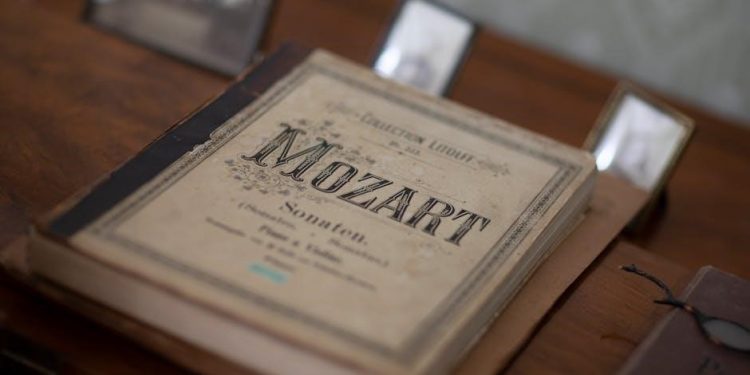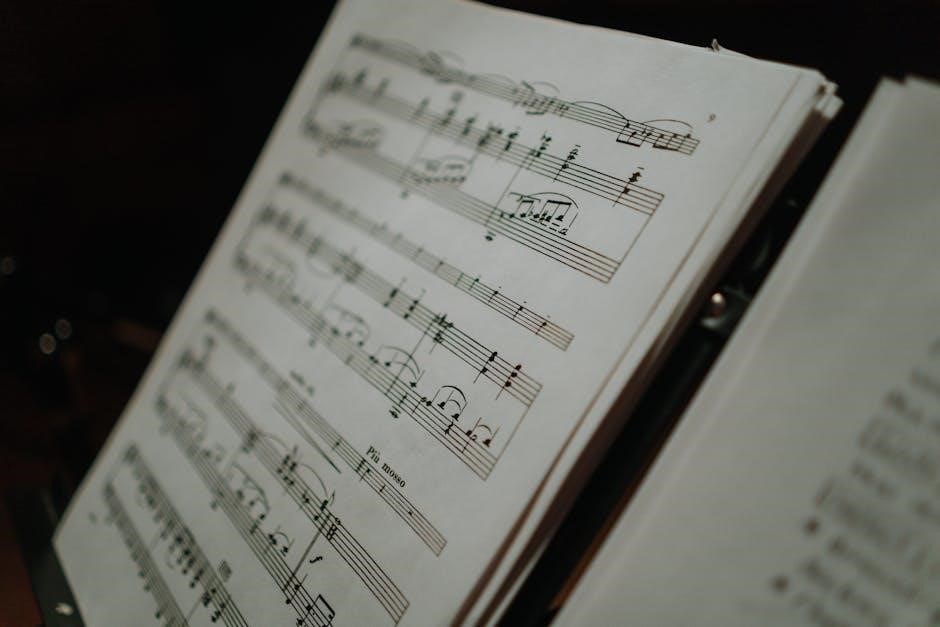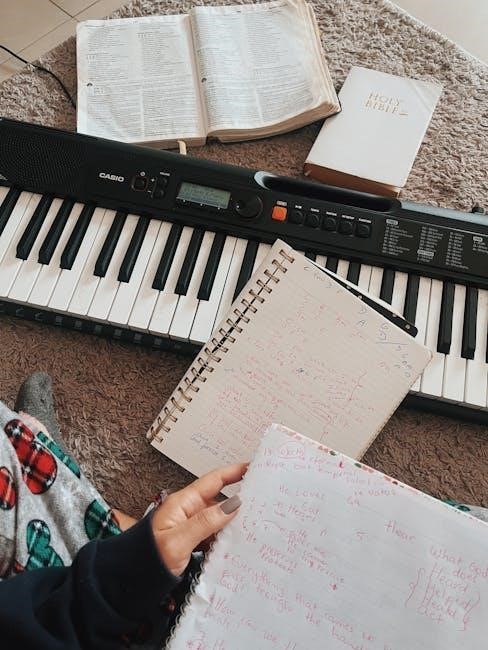
Piano books for beginners in PDF format offer an accessible, interactive way to learn. They provide structured lessons, exercises, and sheet music, catering to diverse learning styles and ages. These resources are ideal for self-paced learning, often featuring visual guides and audio aids. Many are free, making piano education affordable and widely available.

Why PDF Format is Ideal for Learning Piano
The PDF format is highly advantageous for piano learning due to its portability and accessibility. It allows learners to access sheet music and lessons on various devices, making practice convenient anywhere. PDFs are also easily searchable and can include interactive elements like audio clips for better understanding. Additionally, PDF files are widely available for free or at low cost, ensuring that quality piano education is accessible to everyone. They can be downloaded for offline use, making them ideal for those with limited internet access. This format also enables users to organize their learning materials efficiently, ensuring a seamless and structured learning experience.
Key Features of Beginner-Friendly Piano Books

Beginner-friendly piano books in PDF format are designed to simplify learning. They often include clear notation, step-by-step instructions, and visual guides to help understand hand positioning and finger placement. Many feature interactive elements, such as clickable audio files, to aid in rhythm and timing. These books typically start with basic concepts like notes, scales, and chords, gradually progressing to more complex pieces. Exercises and practice sheets are commonly included to reinforce skills. Additionally, some PDFs are tailored for specific age groups, such as children, with colorful illustrations and engaging layouts. These features make learning accessible, fun, and tailored to individual needs.
Top Recommended Piano Books for Beginners in PDF
Top recommended piano books for beginners include “Learn & Master Piano,” “Hal Leonard Student Piano Library,” and “My First Piano Lessons.” These comprehensive guides offer step-by-step tutorials, exercises, and sheet music suited for all skill levels and ages, providing an engaging and structured approach to learning piano effectively.
“Learn & Master Piano” ⏤ A Comprehensive Guide
“Learn & Master Piano” is a highly-regarded PDF guide designed for beginners, offering a detailed, step-by-step approach to learning piano. It covers essential topics such as scales, chords, and music theory, providing a strong foundation for pianists. The guide includes practice exercises, interactive lessons, and audio aids to enhance learning. Suitable for all ages, it progresses from basic concepts to intermediate techniques, ensuring a smooth transition for learners. By completing the sessions and workshops, users gain proficiency in playing diverse styles of music. This comprehensive resource is ideal for self-paced learning and is widely available in PDF format, making it accessible to aspiring pianists worldwide.

“Hal Leonard Student Piano Library” ⏤ Popular Among Beginners
The Hal Leonard Student Piano Library is a beloved resource for beginners, offering a comprehensive and engaging approach to learning piano. Designed to inspire and motivate, it features a wide range of repertoire pieces, exercises, and theory lessons tailored for gradual skill development. The library is known for its interactive and visually appealing format, making it easy for students to follow along. Many educators and students praise its structured progression, which builds confidence and mastery. With its diverse content and user-friendly design, this collection is an excellent choice for those seeking a well-rounded foundation in piano playing.
“My First Piano Lessons” ⏤ Designed for Young Learners
“My First Piano Lessons” is tailored for children aged 5-8, introducing piano basics in an engaging, interactive manner. The book focuses on foundational skills, such as identifying notes, hand positions, and simple melodies. It incorporates visual aids, games, and exercises to keep young learners captivated. Designed to foster creativity and confidence, the lessons are structured to progress gradually, ensuring a smooth transition from basic concepts to more complex techniques. The PDF format allows easy access on various devices, making it a versatile tool for both home and classroom use. This resource is ideal for parents and educators seeking a fun, effective way to teach piano fundamentals to young beginners.

Benefits of Using Free Piano Sheet Music in PDF

Free piano sheet music in PDF offers affordability and accessibility. It provides a wide range of repertoire, from classical to modern pieces, suitable for all skill levels. Websites like MakingMusicFun.net and Hoffman Academy offer high-quality, downloadable resources, making learning flexible and convenient for beginners. These materials often include interactive elements and clear instructions, fostering independent practice and musical growth.

Websites Offering Free Piano Sheet Music
Websites Offering Free Piano Sheet Music
Several websites provide free piano sheet music in PDF format, catering to beginners. MakingMusicFun.net offers professionally arranged sheets, while Hoffman Academy shares beginner-friendly resources. Other platforms like Piano Nanny and Musicnotes offer free and paid options. These sites often include interactive tools and guides, making learning piano accessible. They provide a variety of styles, from classical to modern, ensuring diverse options. Free sheet music websites are invaluable for those starting their piano journey, offering affordable and convenient access to high-quality materials.

How to Choose the Right Sheet Music for Your Skill Level
Choosing the right sheet music for your skill level is crucial for effective learning. Start by assessing your current ability, whether you’re a complete beginner or have some experience. Look for sheet music labeled as “beginner-friendly” or “easy piano,” as these typically feature simplified arrangements. Ensure the music includes clear instructions, fingerings, and tempo markings to guide you. Progressive difficulty is key; opt for pieces that gradually introduce new techniques. Consider free resources from websites like MakingMusicFun.net, which offer a variety of styles and levels. Prioritize sheet music that aligns with your interests to stay motivated. Always preview the content to confirm it matches your skill level and learning goals.

Structure and Content of Beginner Piano Books
Beginner piano books in PDF format typically follow a step-by-step approach, starting with hand positions, notes, and basic rhythms. They progress to scales, chords, and simple melodies, often including practice exercises and popular song examples to engage learners.
Progressive Learning: From Basics to Intermediate
Piano books for beginners in PDF format often follow a structured, progressive approach. They start with basic concepts like hand positions, note reading, and simple melodies, gradually introducing more complex techniques. Early lessons focus on finger dexterity, rhythm, and chord basics, while intermediate sections explore scales, arpeggios, and harmony. Many books, such as Hal Leonard Student Piano Library, introduce five-finger groups before combining them for richer sounds. This step-by-step method ensures steady improvement. Exercises like Hanon exercises or Czerny etudes are included to enhance technical skills. Such resources provide a clear path for learners to transition smoothly from basics to intermediate levels, building confidence and musicality.
Importance of Practice Exercises and Scales
Practice exercises and scales are essential components of beginner-friendly piano books. They help build finger dexterity, improve hand position, and strengthen muscle memory. Scales, in particular, introduce students to musical structure and theory, laying a foundation for more complex pieces. Exercises like Hanon exercises or finger stretches enhance technical proficiency, while arpeggios and chord progressions familiarize learners with harmonic patterns. Regular practice of these elements ensures steady progress, allowing beginners to master basic techniques before advancing to more challenging repertoire. Incorporating exercises and scales into daily practice routines cultivates discipline and accelerates skill development, making them a cornerstone of effective piano learning.

Additional Resources and Tools for Beginner Pianists
Explore online communities, forums, and apps like Hoffman Academy for interactive learning. Utilize software tools for practice tracking and feedback. These resources enhance your piano learning journey effectively.
Online Communities and Forums for Support
Online communities and forums provide invaluable support for beginner pianists. Platforms like Piano World, Reddit’s r/learnpiano, and specialized music forums offer spaces to ask questions, share progress, and connect with fellow learners. These communities often feature discussions on the best resources, including recommended PDF books and sheet music. Members can receive feedback on their playing, tips for overcoming challenges, and motivation to stay consistent. Many forums also host experienced pianists and teachers who offer expert advice. Engaging with these communities can enhance learning, foster camaraderie, and provide a sense of belonging for those on their piano journey.
Apps and Software to Supplement Learning
Apps and software are invaluable tools for enhancing piano learning. Popular options like Piano Maestro and Yousician offer interactive lessons, exercises, and games to make practice engaging. These platforms provide real-time feedback, helping beginners improve technique and timing. Fender Play and Synthopia also offer step-by-step lessons tailored for beginners. Many apps include features like progress tracking, video tutorials, and access to sheet music libraries. They complement traditional PDF books by offering a more dynamic and immersive learning experience. Whether you prefer visual guides or hands-on exercises, these tools cater to diverse learning styles, making them perfect for supplementing your piano education journey.